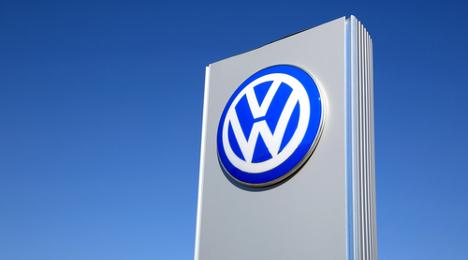VW’s diesel refit plan draws questions

By subscribing, you agree to receive communications from Auto Remarketing and our partners in accordance with our Privacy Policy. We may share your information with select partners and sponsors who may contact you about their products and services. You may unsubscribe at any time.
CARY, N.C. –
In the latest development associated with the Volkswagen diesel vehicle matter, multiple online reports indicate that OEM leadership in Germany is making plans to modify up to 11 million units worldwide to correct the “defeat device” found by environmental regulators that circumvents emissions standards for certain air pollutants.
How VW plans to modify the vehicles — a plan that is projected to cost $6.5 billion — still is drawing a bit of a puzzled response from industry observers.
“The software change is the least costly option for Volkswagen at this point, and has the potential to affect performance and fuel economy more than the more expensive route of adding urea injection,” said Matt DeLorenzo, managing editor of Kelley Blue Book’s KBB.com.
“I find the use of the word 'refit' interesting, as it implies a hardware change, whereas I think they will be updating the engine control module software to make the engine run in the compliant test mode all the time,” DeLorenzo continued. “The other question is whether or not the refit includes any changes to the catalyst itself to make it more robust.”
Here in the U.S., the VW 2.0L 4-cylinder TDI vehicles that do not comply with applicable emissions standards include:
— VW Jetta TDI (model years 2009 – 2015)
Subscribe to Auto Remarketing to stay informed and stay ahead.
By subscribing, you agree to receive communications from Auto Remarketing and our partners in accordance with our Privacy Policy. We may share your information with select partners and sponsors who may contact you about their products and services. You may unsubscribe at any time.
— VW Jetta SportWagen TDI (model years 2009-2014)
— VW Golf TDI (model years 2010-2015)
— VW Golf SportWagen TDI (model year 2015)
— VW Beetle TDI and VW Beetle Convertible TDI (model years 2012-2015)
— VW Passat TDI (model years 2012-2015)
“As environmental protection and sustainability are among Volkswagen’s strategic corporate objectives, the company takes this matter very seriously and is cooperating with the investigation,” Volkswagen Group of America president and chief executive officer Michael Horn said on a special website the OEM created to push information about the matter at vwdieselinfo.com.
Horn’s latest statement can be viewed in the window at the top of this page.
The entire incident certainly has escalated — to the point that Volkswagen replaced its top executive last week.
Furthermore, VW also confirmed on Tuesday what reportedly was in the works — with activities in the U.S., Mexico and Canada being consolidated as one new North American region and Winfried Vahland, formerly the chairman of the board of directors at Skoda, as the leader of the region.
The OEM indicated this newly formed region with Vahland at the controls as president and CEO will be effective Nov. 1.
No matter who is charge within the U.S., Europe and beyond, the automaker is leaving an impression.
“It’s clear Volkswagen and the German government want to address this issue quickly,” Kelley Blue Book senior analyst Karl Brauer. “With those vehicles out of compliance, consumers and government regulators know additional pollutants are being emitted every day, putting pressure on the automaker to correct the problem ASAP.
“Until it’s resolved, it will be difficult for Volkswagen to move forward on resolving consumer trust. And even after a fix is finalized, the logistical challenge of processing millions of diesel vehicles will be daunting,” Brauer continued.
Angered lawmakers
What also might be daunting is the line of questioning lawmakers on Capitol Hill are poised to throw at Volkswagen leadership.
A U.S. House committee already has a hearing in the works to discuss the VW diesel engine issues.
Then earlier this week, a pair of U.S. Senators — Democrats Richard Blumenthal of Connecticut and Amy Klobuchar of Minnesota — urged the Department of Justice to take “strong” civil and criminal actions against Volkswagen for any violations following automaker’s actions that “misled hundreds of thousands of American consumers and resulted in tens of thousands of tons of additional pollution emissions.”
In a letter to Attorney General Loretta Lynch, the senators called for a “thorough but expeditious” investigation.
“Officials at Volkswagen should be granted no get out of jail free card, and the Department should accept no plea agreement with Volkswagen that does not ensure any and all information regarding criminal acts by high level officials is provided to the Department,” Blumenthal and Klobuchar said. “The U.S. government needs to make it clear that these actions, whether involving safety defects, consumer deception, or regulatory violations, will not be tolerated by the American public.”
Broader impact
London-based QUBE sees the appeal of diesel vehicles losing steam in the U.S. because of VW’s troubles.
QUBE’s research team now projects diesel penetration in the U.S. reverting to 3 percent to 4 percent of the market in the long-term against the previous forecast of more than 7.5 percent. It is considered that diesel, as a light vehicle fuel, will revert to mainly being used by medium- and heavy-duty pickup trucks.
“The Euro VI regulations closely align with current U.S. NOx requirements to the extent that offering a diesel on the U.S. market brings little incremental cost for OEMs,” QUBE head of development Calum MacRae said.
“Diesel as a light vehicle fuel in the U.S. has a bit of a trust deficit in any case,” MacRae continued. “For one, many consumers associate it with heavy commercial vehicles; second, many consumers will still recall GM’s failed Oldsmobile diesel engine of the early 1980s.”


